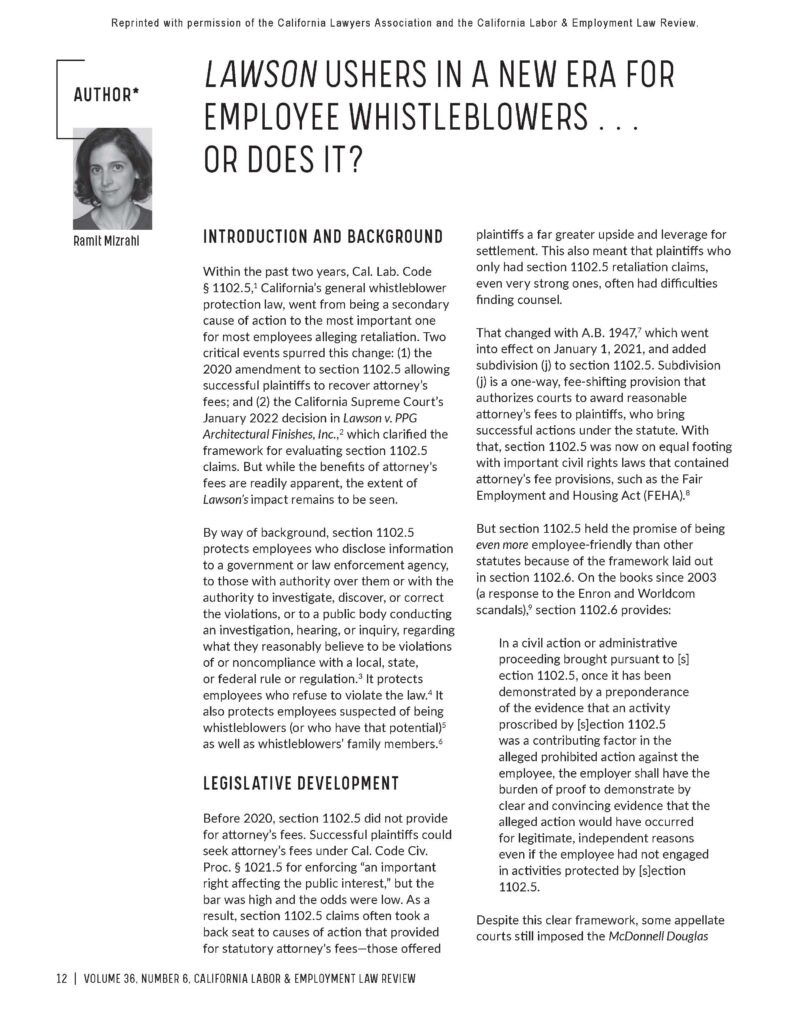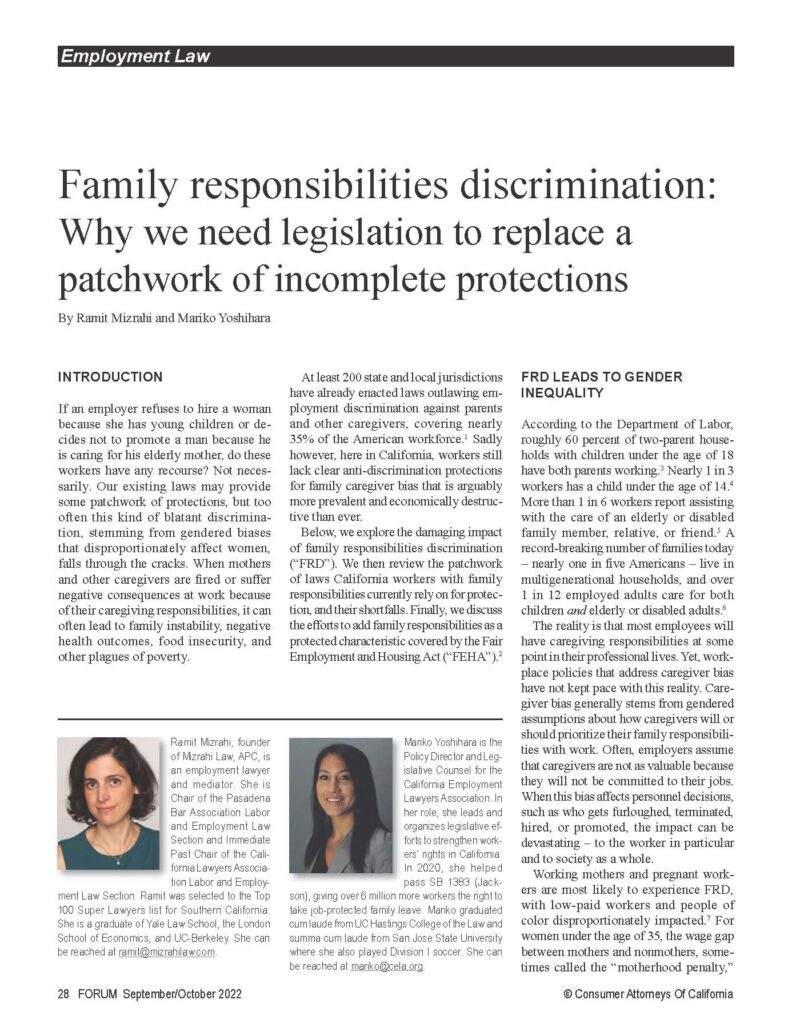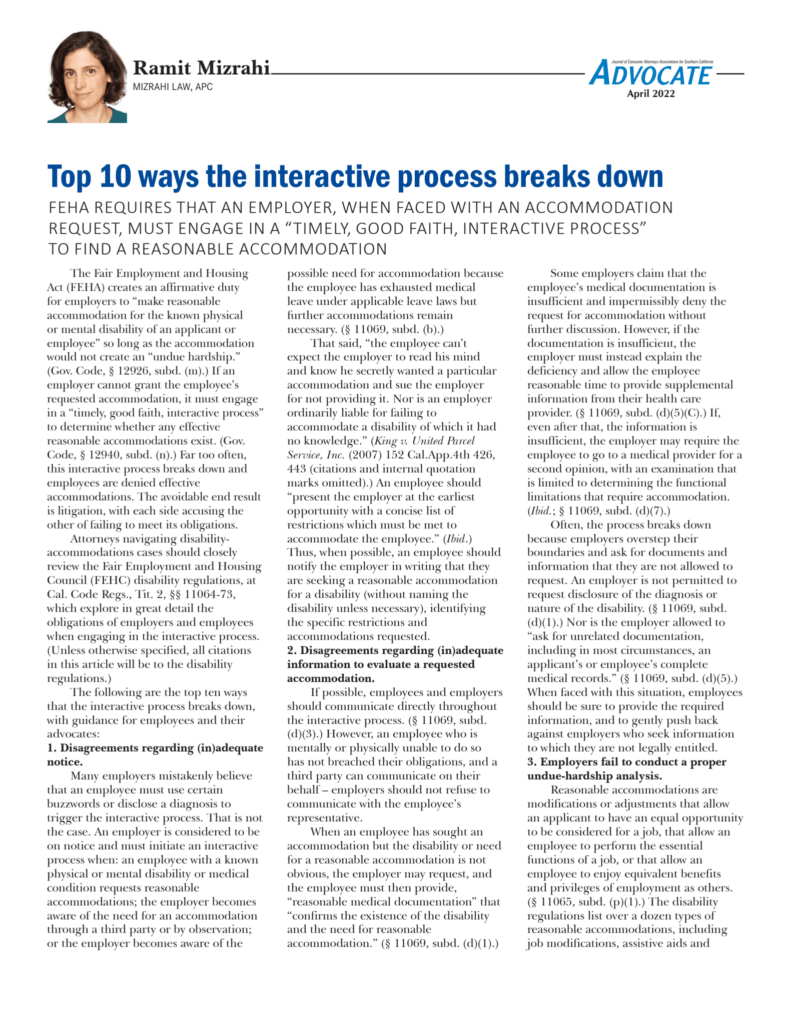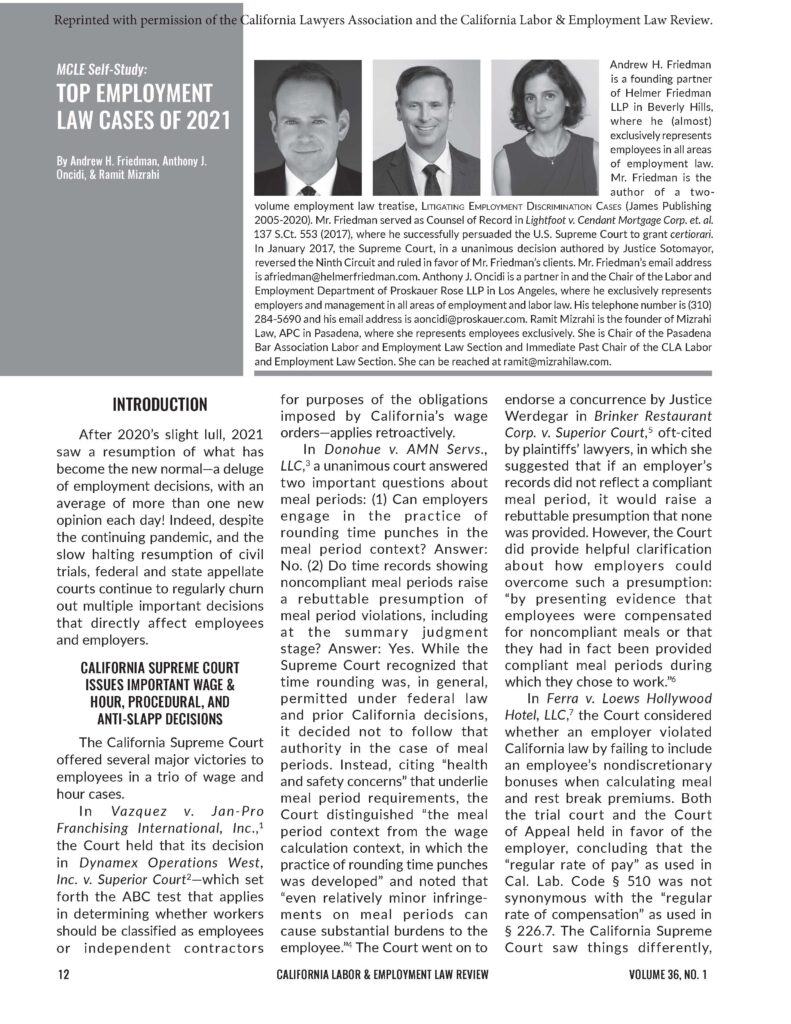-
Within the past two years, Labor Code § 1102.5, California’s general whistleblower protection law, went from being a secondary cause of action to the most important one for most employees alleging retaliation. Two critical events spurred this change: (1) the 2020 amendment to section 1102.5 allowing successful plaintiffs to recover attorney’s fees; and (2) the California Supreme Court’s January 2022 decision in Lawson v. PPG Architectural Finishes, Inc., 12 Cal. 5th 703 (2022), which clarified the framework for evaluating section 1102.5 claims. But while the benefits of attorney’s fees are readily apparent, the extent of Lawson’s impact remains to be seen.
In its November 2022 issue, the California Labor & Employment Law Review published an article by Ramit Mizrahi that examined all published and unpublished California and federal appellate decisions and federal district court cases that addressed Labor Code § 1102.5 claims post-Lawson. The results suggest that defendants continue to prevail on summary judgment, and some courts may be treating the first step in the sections 1102.5/1102.6 analysis as creating a heavier burden than the first step in the McDonnell Douglas test. If so, the benefits of section 1102.6 to plaintiffs may largely be neutralized.
Click below to read the article in full.
-
In its September/October 2022 issue, CAOC Forum published an article by Ramit Mizrahi and Mariko Yoshihara on family responsibilities discrimination.
The article explores the damaging impact of family responsibilities discrimination. It then reviews the patchwork of laws California workers with family responsibilities currently rely on for protection, and their shortfalls. Finally, the articles discusses the efforts to add family responsibilities as a protected characteristic covered by the Fair Employment and Housing Act (“FEHA”).
Click below to read the article in full.
-

On May 11, 2022, Ramit Mizrahi appeared on KALW’s Your Legal Rights radio show to discuss workplace harassment–and retaliation–as people return to the workplace, along with with Michael Robbins, Jeffrey Hayden, and Dean E. Johnson. You can listen to the program here.
The following resources may also be helpful:
- A blog post delving into sexual harassment;
- An article by Ramit Mizrahi on sexual harassment litigation in the post-#MeToo era;
- A blog post on H.R.4445, the Ending Forced Arbitration of Sexual Assault and Sexual Harassment Act of 2021;
- A blog post on new California employment laws in 2021; and
- A blog post on new California employment laws in 2020.
-
Navigating the process to get reasonable accommodations at work can be challenging.
The Fair Employment and Housing Act (FEHA) creates an affirmative duty for employers to “make reasonable accommodation for the known physical or mental disability of an applicant or employee” so long as the accommodation would not create an “undue hardship.” If an employer cannot grant the employee’s requested accommodation, it must engage in a “timely, good faith, interactive process” to determine whether any effective reasonable accommodations exist. Far too often, this interactive process breaks down and employees are denied effective accommodations. The avoidable end result is litigation, with each side accusing the other of failing to meet its obligations.
In its April 2022 issue, Advocate Magazine published Ramit Mizrahi’s article, Top 10 Ways The Interactive Process Breaks Down. Click below to read the article in full.
-
16 Mar '22

On March 3, 2022, President Biden signed into law H.R.4445, the Ending Forced Arbitration of Sexual Assault and Sexual Harassment Act of 2021 (“Act”). The Act provides, in relevant part, that:
“Notwithstanding any other provision of this title, at the election of the person alleging conduct constituting a sexual harassment dispute or sexual assault dispute, or the named representative of a class or in a collective action alleging such conduct, no predispute arbitration agreement or predispute joint-action waiver shall be valid or enforceable with respect to a case which is filed under Federal, Tribal, or State law and relates to the sexual assault dispute or the sexual harassment dispute.”
What this means is that employers can no longer force employees who have been subjected to sexual harassment or sexual assault to submit their legal claims to arbitration. Employees can now choose to file their cases in court, regardless of the prior existence of an arbitration agreement. Nor can employers force employees to give up the right to file a class or collective action related to sexual harassment or sexual assault.
The Act explicitly provides that it applies to any dispute or claim that arises or accrues on or after the date of enactment, meaning any harassment or sexual assault occurring on or after March 3, 2022. It does not apply to existing cases already in arbitration or ones where the sexual harassment or assault only occurred before March 3, 2022.
The Act provides that any dispute regarding the applicability of the Act to an arbitration agreement must be decided by a court, not an arbitrator.
We anticipate that more employment lawsuits will include claims for sexual harassment, and that courts will invalidate arbitration agreements in those cases.
This law levels the playing field by giving people subjected to sexual harassment and sexual assault a fair shot at justice. Research has shown that consumers are more likely to be struck by lightning than to win a monetary award in arbitration. We hope it opens the door to further legislation prohibiting arbitration in all employment and consumer cases.
-
The January 2022 issue of the California Lawyers Association’s Labor & Employment Law Review features an article authored by Ramit Mizrahi, Andrew Friedman, and Tony Oncidi.
The article—”The Top Employment Cases of 2021″—highlights the most important California state and federal employment cases from last year. Click on the below image to read the article in full.
Ramit will also be speaking at the following continuing education program this month:
Thursday, 1/20/22, 8:30-10 a.m.
2022 New Employment Practitioner Conference, Employment Law 101
Program by: California Lawyers Association Labor and Employment Law Section
Description: California provides employees with numerous protections that practitioners need to understand to provide effective representation. In this module, our panelists will provide an overview of filing and defending against claims of discrimination, harassment, and retaliation provided by the Fair Employment & Housing Act, Title VII of the Civil Rights Act, and other key employment laws. The presentation will touch upon exhaustion of administrative remedies, the essential points of analysis for claims, recent changes to the law, and emerging trends and concerns. -

On November 10, 2021, Ramit Mizrahi appeared on KALW’s Your Legal Rights radio show to discuss the new employment laws passed in 2021.
You can listen to the program here and read our blog post delving into the new laws (including some the program did not cover) here.
-

Introduction — California Protections for Pregnant Workers
California law offers strong protections to employees who have been subjected to discrimination and harassment. Despite that, pregnancy discrimination and retaliation for standing up to discrimination remain rampant. Once employees have been wrongfully terminated, they often know to reach out to seek legal help immediately. But current employees are often more confused about what to do. They may rightfully feel afraid about reporting unlawful conduct to Human Resources, particularly when the conduct is coming from their immediate supervisor. What if it just makes the situation worse? Indeed, far too often, Human Resources is more concerned with protecting the company than with taking the immediate corrective action that the law requires of them. A retaliating supervisor can make a job feel like death by 1,000 paper cuts: scrutinizing, criticizing, and nit-picking every action by an employee, making them feel ostracized or humiliating them in front of their peers, and leaving them in a constant state of fear and anxiety. Indeed, if true, the experiences of the Google employee whose memo went viral demonstrate the myriad ways that a company can fail its employees and allow discrimination and retaliation to persist.
An employee’s best hope is to be fully informed about their legal rights. They can then decide whether to report internally, to file a claim with one of the government agencies that investigates and enforces anti-discrimination laws, to seek private counsel to negotiate an exit or to file suit, or to make a conscious decision to wait (being mindful that if a person waits too long, they may forever lose their ability to assert the claim–a post on this topic will be forthcoming). To that end, I provide the following brief overview of employment protections for California workers subjected to pregnancy discrimination and retaliation. Note that many of these topics have been covered in greater depth elsewhere throughout the blog. (The archive categories are listed to the right of this post.)
1. Discrimination
The Fair Employment and Housing Act (“FEHA”) prohibits discrimination against employees because they belong to a protected category (sex, pregnancy, race, religion, disability, etc.). This includes refusing to hire or promote employees, terminating them, or discriminating against them in compensation or in terms, conditions, or privileges of employment.
2. Harassment
The FEHA further prohibits harassment against employees, applicants, unpaid interns or volunteers, and contractors because of their protected status. Employers are strictly liable for harassment by a supervisor. They are liable for harassment by non-supervisors, and even non-employees, if they knew or should have known of the conduct but failed to take immediate and appropriate corrective action. Employers are obligated to take all reasonable steps to prevent harassment from occurring. An employee need not lose tangible job benefits (e.g., be terminated or demoted) to establish harassment. More on workplace harassment can be found here.
3. Retaliation
The FEHA protects an employee who has “opposed any practices forbidden” under the Act.
An employee is engaging in protected activity when she opposes any practice that would violate the FEHA, even if the practice is not directed at her: “The ‘opposition’ clause protects conduct by an employee who is not the direct victim of a practice made unlawful under Title VII, but who ‘opposes’ such discrimination against others.” (Chin, et al., Cal. Practice Guide Employment Litigation (2019 The Rutter Group) ¶ 5:1527.) Thus, it is unlawful for an employer to retaliate against an employee who reports or otherwise opposes pregnancy discrimination. The FEHA separately imposes liability on an employer for failing to prevent retaliation.
An employee does not have to be right that discrimination actually occurred; they are protected if they had a good-faith belief of discrimination.
Employees also have protections under California’s general whistleblower protection statute, Labor Code § 1102.5, which protects employees from retaliation when they (1) disclose information that they reasonably believe to violate state, federal, or local laws or regulations, or (2) refused to participate in any activity that would violate state, federal, or local laws or regulations.This protection applies whether the employee complains (a) externally to a government or law enforcement agency or to a public body conducting an investigation, inquiry or hearing, or (b) internally to “a person with authority over the employee or another employee who has the authority to investigate, discover, or correct the violation or noncompliance” (e.g., their manager or HR).
Employees are protected even if the disclosures were part of their job duties (so for example, a safety officer is still protected when speaking out about unsafe conditions). Family members of a person who has, or was perceived to have, engaged in protected activities are also protected from retaliation.
Despite these protections, research has shown that when discrimination or harassment is reported, the consequences can be dire: an estimated 75% of employees who speak out against workplace mistreatment faced some form of retaliation.
-

So you think you have an employment discrimination or wrongful termination case and are looking to hire a lawyer. Just as you must evaluate the lawyer to decide if they are right for you, the lawyer must assess your legal claims to determine whether they should represent you. Once you have gone through the preliminary consultation and conflict check, the lawyer will likely schedule an in-person or Zoom meeting to delve into your claims in greater detail. The more information you have readily available, the more easily the lawyer can assess your claims. Of course, that does not mean you should share every scrap of paper conceivable! Below, I describe what information and documents you should share to help the consulting lawyer evaluate your case.
-

You say it’s a “hostile work environment.” But is that workplace bully breaking the law? The answer may surprise you.
So your boss/supervisor is a jerk. He’s mean, abusive, and he talks down to you. He embarrasses you in front of others and he diminishes your work. You think he may be sabotaging you and intentionally setting you up to fail. Surely he’s breaking the law and you have a case, right?
Not necessarily.
Mizrahi Law Blog
Mizrahi Law, APC
- 35 N Lake Ave, Ste 710, Pasadena, California 91101
- dates@mizrahilaw.com
- (626) 380-9000
Client Testimonial
“I highly recommend Ramit Mizrahi. She has a winning combination of knowledge, passion, strategy, and empathy. She takes action and communicates updates promptly. Her professionalism is hard to beat. I’d give her 10 stars if I could!”
Latest News
- Ramit Mizrahi has been recognized as one of the Top 100 Super Lawyers and Top 50 Women Super Lawyers in Southern California in 2023.
- Ms. Mizrahi is being recognized in the 2023 Edition of The Best Lawyers in America©, published by U.S. News & World Report and by Best Lawyers.
- Ms. Mizrahi has been selected as a Top Attorney by Pasadena Magazine for 2023.
- Ms. Mizrahi is serving as Chair of the Pasadena Bar Association Labor and Employment Section.




